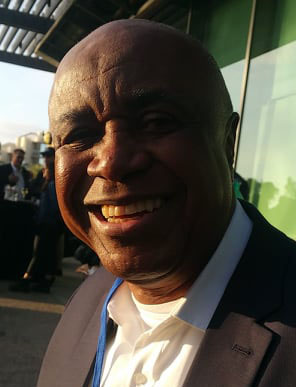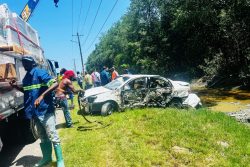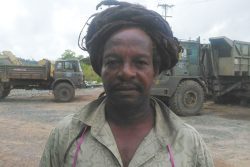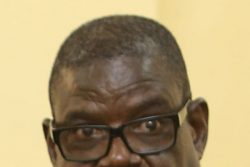Guyana needs to get independent help to craft its plans for the oil and gas sector, while also building local capacity, the former head of Brazil’s oil and gas regulatory body Nelson Narciso Filho has said.
“It is better to get someone independent and especially with the experience of implementing things and not just writing things. When it comes to building capacity, the country needs a lot of help,” Narciso Filho, the former National Agency of Petroleum, Natural Gas and Biofuels (ANP) head, told Stabroek News last week in an interview.
The interview was done on the sidelines of the Institute of the Americas’ La Jolla Energy Conference, where Narciso Filho was also part of a panel discussion on Brazil’s Energy Outlook under President Jair Bolsonaro.
Last month, Brazil’s state-run oil firm Petrobras presented a five-year strategic oil plan for the oil and gas sector to the Government of Guyana.
Narciso Filho, who served as Director of the Brazilian regulatory agency for oil and gas from 2006 to 2010 and who has extensive knowledge of management and business in Exploration and Production (E&P) as well as startup operations in his home country, Angola and Namibia, posited that while he would not single out any company, he believes that assistance for Guyana must come from sources without vested interests. “You need independent help. I am not saying not Petrobras or this or that company. I am saying you have to get a plan suited to your country and it has to be independent, it must be independent,” the consultant, who has held senior positions at E&P companies and service providers, including HRT Africa, Halliburton, ABB and Hughes WKM, stressed.
Narciso Filho’s views are similar to those of former government petroleum adviser Jan Mangal, who maintains that Guyana needs to develop its own strategic plan for the oil and gas sector in order to ensure that its interests are protected.
“Guyana should not pay too much attention to these studies by others. Countries need to do their own studies and not rely on whomever comes calling. A study by the Brazilians will be for Brazil’s interest. Just like the gas study by the Japanese was for Japan’s interests, and not for Guyana’s,” Mangal had told Stabroek News recently.
Mangal also believes that Guyana should delay oil and gas production until it gets its institutions, plans and legislation right.
He said that with weak systems, this country opens itself to being dominated, which can lead to the loss of potential revenue.
“Oil companies achieve their objectives by producing oil as quickly as possible, but the objectives of oil companies and the objectives of countries are different. Guyana needs to delay and also constrain the production to improve Guyana’s interests,” he said.
Petrobras has been under scrutiny in the last few years for massive corruption and the government here has been warned to proceed with extreme caution in dealing with the company. In September last year, Petrobras was fined US$853 million by the US Department of Justice to settle charges that former executives and directors broke US anti-corruption laws by bribing politicians and then sought to conceal the payments amounting to hundreds of millions of dollars. The payments were facilitated by executives at the “highest levels,” including the firm’s board, the Department of Justice had said.
The firm also made a US$2.95 billion payment to settle a US class action corruption lawsuit last year.
Guyana’s Department of Energy head, Dr Mark Bynoe, has said that it was Georgetown which asked Brasilia for assistance.
Reached out
“The government reached out to Petrobras. We utilised our ambassador in Brazil, Ambassador George Talbot, and this was an official visit that came through the Ministry of Foreign Affairs,” Bynoe replied, when asked by Stabroek News about who initiated the engagement.
He said the two countries have identified at least seven areas of possible collaboration but Petrobras representatives indicated that they only wanted to focus on two during the last visit.
“We have identified at least seven potential areas that we can collaborate [on] going forward. Petrobras indicated that for this current visit they wanted to focus on two, which largely centred on issues relating to a licensing round and their own expertise in deepwater exploration,” Bynoe said.
When Petrobras’ plan was handed over, Bynoe, who was present at the meeting, had said that government welcomed the support while pointing out that external help would complement the department’s plans.
“We are like you; we have a vision, a strategic plan in terms of where we are going… currently we have a roadmap and we trust that over time, we begin to enhance our own capacities through [bringing] in third-party expertise and then Guyanese expertise moving forward as minister indicated with training,” he had said.
Bynoe added that despite the current challenges concerning the oil and gas industry, Guyana hopes to establish a concrete plan that will benefit its citizens.
Petrobras, Chevron and France’s Total are among nine companies that government had said were seeking remaining oil blocks here and government was exploring both “direct engagements” and a “select bidding process” in assigning them.









